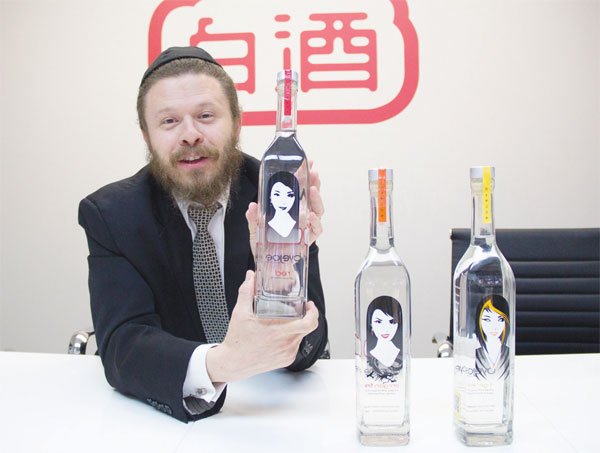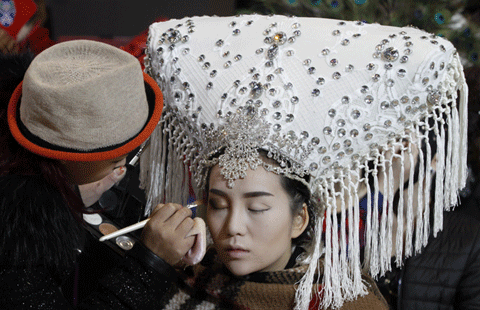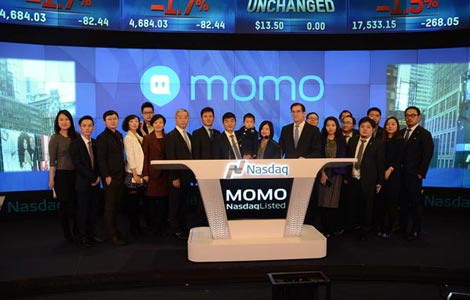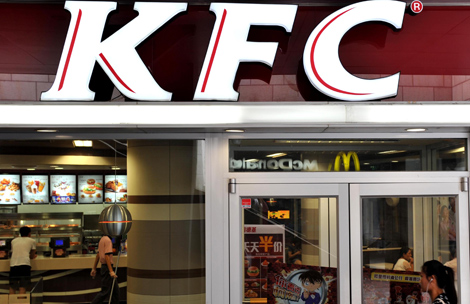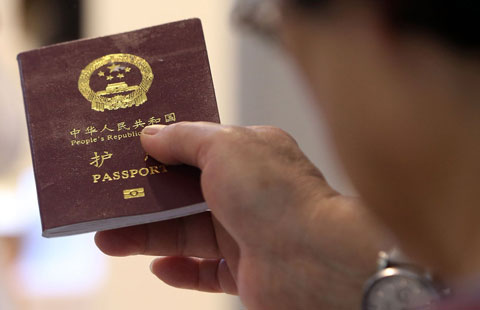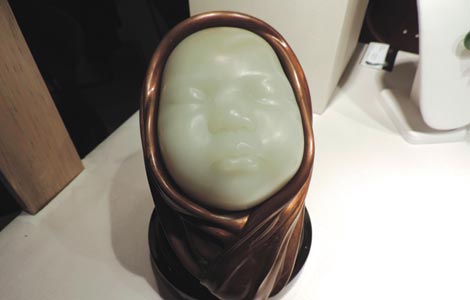Bringing the spirit of China to the world
Updated: 2014-12-12 14:34
By May Zhou in Houston(China Daily USA)
|
||||||||
|
Bye Joe USA CEO and President Matt Trusch explains the flavors of byejoe at his corporate office in Houston. May Zhou / China Daily |
Matt Trusch wanted to sell a product that is distinctively Chinese, and he figured what better way than a drink shared on special occasions.
Trusch set his heart on baijiu – a Chinese liquor made of red sorghum – and came up with the name "byejoe" which he remarks is "a name that any Joe on the street can pronounce."
"Baijiu is a big part of Chinese culture. At banquets big or small, or when friends get together, you almost always find it on the table. Chinese just can't live without it," said Trusch, the president of Bye Joe USA, headquartered in Stafford, Texas, with an office in Shanghai.
Trusch, sporting a beard and kippah, often surprises Chinese people who meet him for the first time when he speaks flawless Chinese.
He is direct about what he wants to accomplish with his new company and byejoe brand : "The bar is like a mini United Nations: You find sake from Japan, vodka from Russia, champagne from France, whisky from Scotland, beer from Germany, tequila from Mexico and so on; yet there is nothing from China. I want China's liquor to be represented in the mini-UN."
While pursuing graduate studies in Chinese history at Harvard, Trusch decided to trade his academic pursuits for a real Chinese experience by moving to Shanghai in 1997.
Prior to that, he studied Chinese in high school and college, studied abroad in Beijing and Harbin, and worked for Merrill Lynch Asia as an investment banker in Hong Kong and Singapore for a few years.
Trusch mastered Chinese and made some fame for himself in his 12 years living in Shanghai: He pursued a career in acting and starred in numerous TV shows and movies. He made his living by doing just that and became a celebrity of sorts in China's entertainment industry.
However, after Trusch got married, he and his wife decided to settle down in Houston where he grew up.
"When I decided to come back, I thought to myself: I want to bring some Chinese culture and history to the US, to the world."
Trusch first encountered baijiu in 1992 while studying at the Harbin Institute of Technology.
"It hit me hard, and I just loved it," recalled Trusch. Apparently, the Chinese liquor left Trusch an impression strong and long enough to become his current passion.
There is another reason for Trusch to make it his mission to bring Chinese liquor to the US: "During the WWII, Chinese saved a lot of my people the Jewish refugees. I feel that it's my obligation to introduce some of the Chinese culture to the world."
"Spirit of China" is the tagline for byejoe, and for Trusch, this has symbolic meaning: "China has truly come to the world stage since the 2008 Olympics, and now it's time for the West to experience baijiu. I think it's inevitable that China's baijiu will become a global spirit. If I don't do it, sooner or later someone else will. I want to be the pioneer."
Chinese liquor is divided into three major category by its aroma: saucy, strong and light. Currently, byejoe is marketing the light-flavored liquor. To make the Chinese liquor more suitable for the US market, Trusch chose to modify the strong Chinese liquor somewhat.
"The original Chinese liquor is usually 50-60% alcohol, too strong for Western consumers. We import small batches of the finest liquor distilled from red sorghum in China to the US, where we refilter it in order to guarantee byejoe meets the highest international quality standards as well as US FDA health standards," explained Trusch.
The natural refining process also enhances the purity of the Chinese liquor: "In the end, we get a liquor of ultra premium quality with smooth flavor."
Moreover, byejoe's packaging emphasizes the modernity of China. "Most Chinese liquor bottles are short and fat — traditional and old fashioned. However, people in general don't know much about Chinese culture and history, and they are usually more interested in the modern China: China has the tallest buildings, the fastest bullet trains, and such. We want to project the image of modern China with a tall and slender bottle like a towering Shanghai skyscraper," Trusch said of the idea behind the design.
In the West, people rarely drink such strong liquor by itself. The marketing of byejoe, therefore, is fashioned after vodka and tequila – primarily used to make all sorts of cocktails. However, while vodka is a tasteless spirit, Trusch said byejoe "red" has a hint of the original red sorghum flavor, while its "dragon fire" is infused with dragon fruit, lychee and hot chilies.
"Essentially we are creating a new liquor category in the US," said Trusch. "We have specifically developed our own cocktail recipes that you can find at our website byejoe.com."
Some cocktail names, not surprisingly, make strong Chinese statements – such as Jade Nights, Sleepy Dragon and Shanghai Moon.
Bye Joe USA is a private enterprise owned by a few American and Chinese investors, including Yao Ming's investment group, according to Trusch. From 2011-13, Bye Joe USA spent two years in product research and development, and to obtain the more than 60 different certificates and licenses necessary to sell liquor in the US. Byejoe began sales for the Chinese New Year 2013.
Less than two years into business, byejoe has already won more than 30 medals in international spirits competitions. The byejoe brand is now being sold at more than 500 different outlets in 10 markets across the US, including prestigious outlets such as Buddakan in New York, Hakkasan in Miami, Crustaceans, Philippe Chow and The Peninsula Hotel in Beverly Hills. Houston alone has more than100 outlets.
While refraining from disclosing actual sales figures, Trusch did say that the business is doing performing "well beyond our expectations".
mayzhou@chinadailyusa.com
Most Viewed
Editor's Picks

|

|

|

|

|
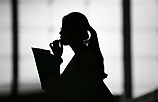
|
Today's Top News
China: Climate focus should be on Paris deal
Climate change agenda marches on, despite its obstacles
Baidu expected to take stake in Uber
Industry observer expects $60 crude to hold
China, US to tap trade, investment potential
Chinese brands face overseas challenges
Goal: coal to synthetic gas
Despite sales slump, fast food moves ahead in China
US Weekly

|

|
